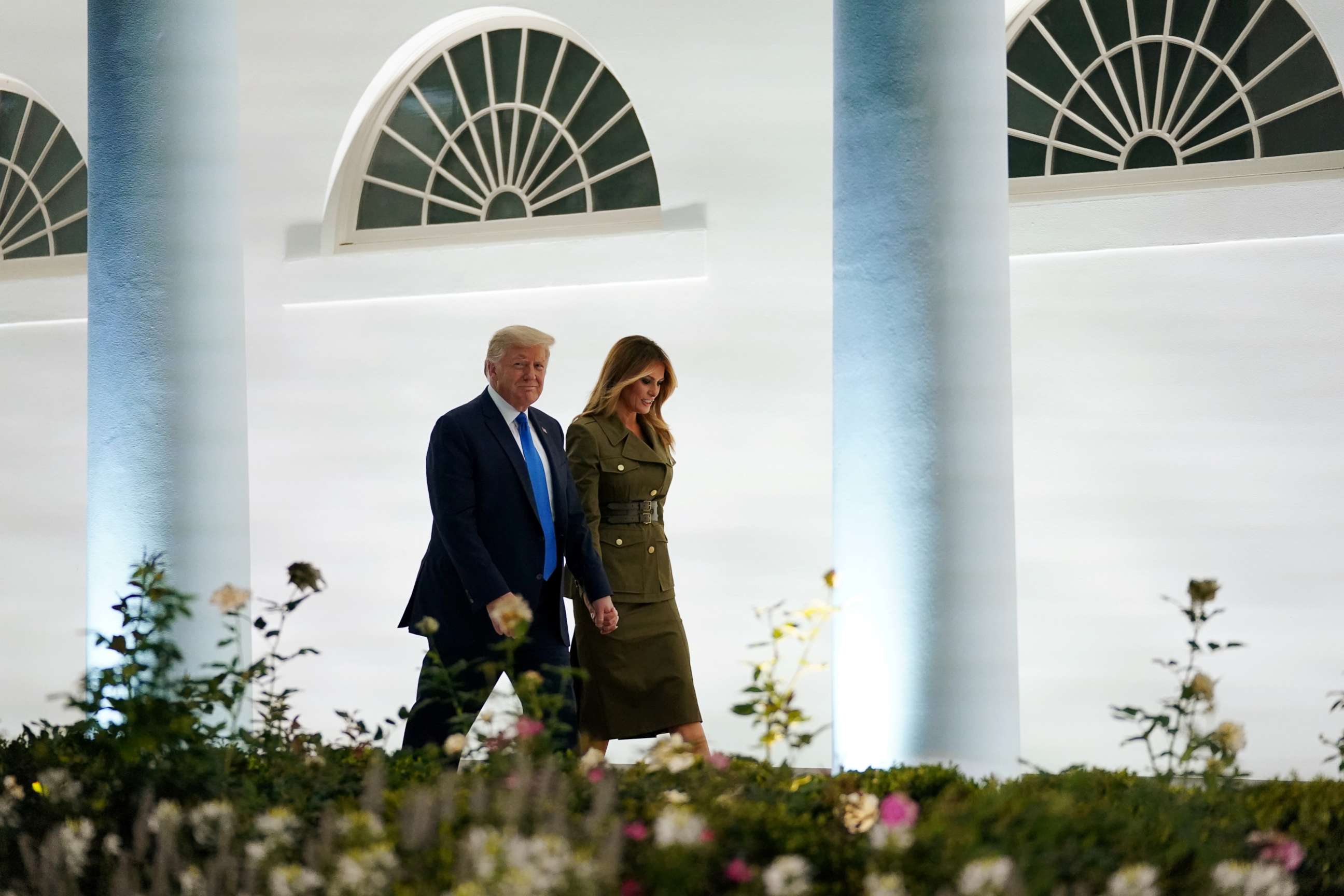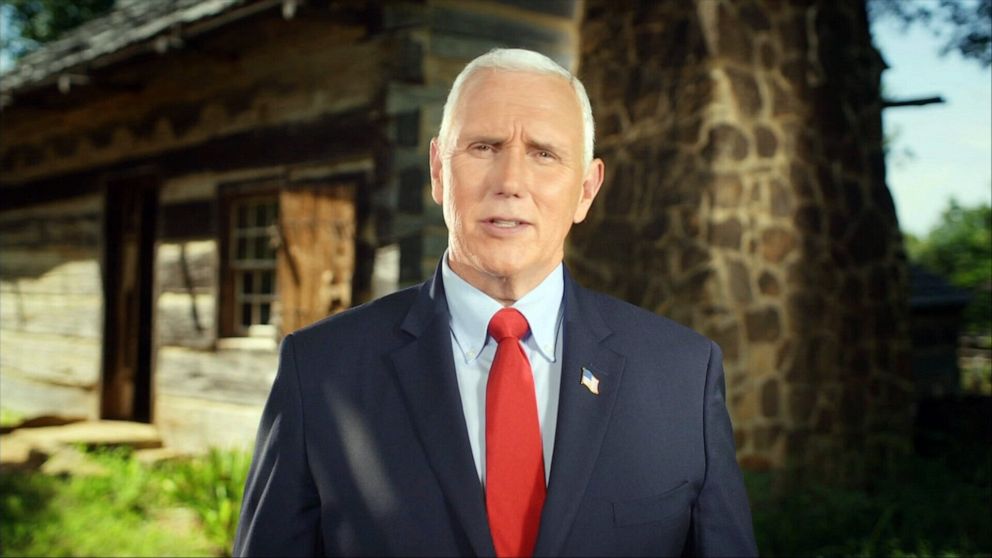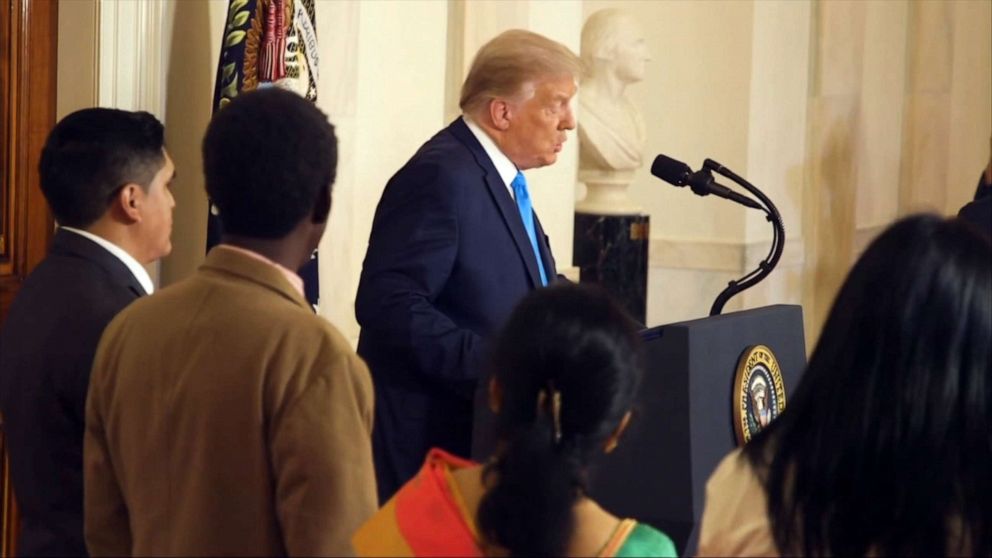The Note: Softer side of Trump conflicts with term filled with hard edges
Trump seems focused now on having people simply like him
The TAKE with Rick Klein
President Donald Trump has been praised this week -- and has praised himself -- for welcoming immigrants, pardoning criminals, protecting health care, ending wars and fighting to end racial injustices.
In the midst of a dark Republican National Convention, filled with images of unrest and depictions of Democrats as socialists and criminals, the softer sides of Trump have been highlighted along the way.
First lady Melania Trump made the point explicit in her speech closing out Tuesday night's session -- one of the few to explicitly acknowledge that the COVID-19 crisis is not over, and that America is in the midst of a reckoning over race.

"It is in times like this that we will look back and tell our grandchildren that, through kindness and compassion, strength and determination, we were able to restore the promise of our future," she said.
Vice President Mike Pence gets his turn Wednesday. It's fair to assume there will be at least a passing reference to "broad shoulders and a big heart."
These are not necessarily themes or policies often associated with Trump. Yet, for a large portion of his base, even his most vitriolic attacks offer their own kind of optimism -- an assurance that the president is on their side, if nothing else.
Trump's campaign is using validators to soften his harder edges, presumably to appeal back to that base. For a party reliant on white voters, there's an enormously diverse speaking lineup; for a party with a billionaire leading the way, there are distinct accents of New England lobstermen and Midwestern farmers.
The president is far more likely to be judged by his actions than the words offered at his convention. But the words now matter, and Trump seems focused now on having people simply like him.
The RUNDOWN with MaryAlice Parks
Vice President Mike Pence will speak Wednesday from Fort McHenry to cap off night three of the Republican Party's convention.
Four years ago, Pence was viewed as a crucial connection between Trump and evangelical political leaders. The strict anti-abortion, former governor had also pushed the envelope on local state legislation curtailing the rights of LGBTQ Americans.
Four years ago too, religion and church-attendance was a key clue about voter preference. The big question now -- will the line be so clear this go-around?

Fast-forward to this moment -- the vice president's role has changed and this week alone, a major figure in the evangelical community has been rocked by scandal.
These days, Pence campaigns across the country while the president has forged his own ties with far-right evangelicals during his first term. Billy Graham's granddaughter gave her ringing endorsement of the president and his socially conservatives policies on Tuesday night, as other speakers celebrated Trump's appointment of conservative federal judges and focused on other evangelical priorities.
Still, the relationship between church, faith and politics seems more complicated this election -- more publicly debated across the aisle.
"They would speak of faith? The choice here is so simple. One man waves a borrowed Bible around, the other actually reads it," former 2020 Democratic candidate Pete Buttigieg tweeted Tuesday, following Cissie Graham Lynch's remarks.
Be it the president's stance on refugees, treatment of children at the border, or defiance on climate change, Democrats have seen an opening in some religious circles, and likewise, some church leaders on the left have become noticeably more vocal and political themselves.
The TIP with Meg Cunningham and Benjamin Siegel
The White House is opening its doors to GOP candidates across the country for the president's acceptance speech on Thursday -- including to those who have publicly stated their support of the QAnon conspiracy theory, which in part says that Trump is saving the world from a satanic cult of pedophiles and cannibals.
Marjorie Taylor Greene, a Republican House candidate in Georgia who is almost certain to win her election in November, has supported and repeated these theories. So has Lauren Boebert, who is running for Congress in western Colorado. Both candidates said on Tuesday that they were invited to the White House for Trump's speech.

Trump hasn't denounced QAnon or its supporters and said in a news conference last week, "Well I don't know much about the movement, other than I understand they like me very much -- which I appreciate," he said. "I've heard these are people that love our country."
While House Republican Conference Chair Liz Cheney has condemned the conspiracy as a "dangerous lunacy that should have no place in American politics," House Minority Leader Kevin McCarthy has embraced both of these candidates. He added Boebert to the Republicans' "Young Guns" recruitment program that he leads, and said through a spokesperson that the GOP conference looks forward to Greene winning in November.
THE PLAYLIST
ABC News' "Start Here" Podcast. Wednesday morning's episode features a conversation with Rep. Steve Scalise after the second night of the Republican National Convention. ABC's "The View" co-host and former prosecutor Sunny Hostin unpacks the police shooting of Jacob Blake in Wisconsin. And, ABC News Chief Medical correspondent Dr. Jennifer Ashton separates fact from fiction when it comes to coronavirus plasma therapy and reinfection.http://apple.co/2HPocUL
ABC News' "Powerhouse Politics" Podcast. Kentucky Attorney General Daniel Cameron joins ABC News Political Director Rick Klein and Chief White House Correspondent Jonathan Karl following his primetime address on the second night of the Republican National Convention. On Tuesday, veteran GOP strategist Frank Luntz said on the podcast that the RNC should focus more on the story of America and less on the story of President Donald Trump.. https://bit.ly/2w091jE
FiveThirtyEight's Politics Podcast. On the first night of the 2020 Republican National Convention, traditional Republicans like former U.N. ambassador Nikki Haley and Sen. Tim Scott, R-S.C., delivered speeches that sharply contrasted with the Trump enthusiasts who spoke, like Donald Trump Jr. and former Fox News host Kimberly Guilfoyle. The FiveThirtyEight Politics podcast crew makes sense of the varied night. https://53eig.ht/2E06IDH
WHAT YOU NEED TO KNOW TODAY
Download the ABC News app and select "The Note" as an item of interest to receive the day's sharpest political analysis.
The Note is a daily ABC News feature that highlights the key political moments of the day ahead. Please check back tomorrow for the latest.




